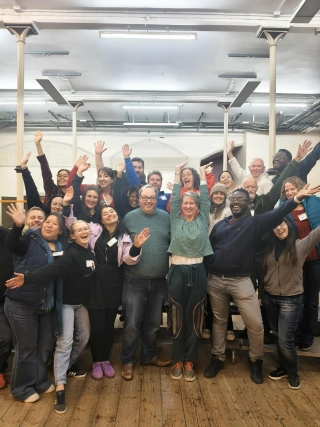Add a comment
Listening Deeply with Bristol A Cappella
‹-- PreviousNext --› I spent Saturday with my friends at Bristol A Cappella, revisiting their set from the European and BABS Conventions back in May in preparation for the World Mixed Chorus contest in Germany next Spring. By now they are deeply familiar with the music and their performance plans for it, and this presents the opportunity to do the kind of deep work that only becomes possible when you no longer have to focus on what you are doing and can direct your attention to the how.
I spent Saturday with my friends at Bristol A Cappella, revisiting their set from the European and BABS Conventions back in May in preparation for the World Mixed Chorus contest in Germany next Spring. By now they are deeply familiar with the music and their performance plans for it, and this presents the opportunity to do the kind of deep work that only becomes possible when you no longer have to focus on what you are doing and can direct your attention to the how.
Much of our work focused on listening techniques, finding ways to enhance everyone’s perception of what they were doing, since the first stage of refining your execution is increasing the acuity with which you hear the detail. Duetting inevitably played a part in this, with a lot of micro-adjustments making themselves through the process in addition to the explicit observations singers made as we walked through the process.
We also used the principle of a ‘virtual ear’ as a focus for listening for lock and ring. Rather than teaching it as a standalone exercise as I usually do, we deployed it to spot-fix moments within the repertoire, using the syllable from the musical context on the unison root of a chord to establish the lock, then adding the 5th once the overtones started spiralling above us. After that we were ready for the 3rd in the voicing as given in the song, and were rewarded with a whole new dimension of shine on the sound.
Another approach to cleaning up details of balance, vowel, and tone match was to block individual chords, staying with each until the singers felt able to let go of what they personally were doing and widen their perception into the sound as a whole. You can hear immediately when people have found this headspace, as the chord suddenly comes into focus as a coherent unit with its own colour and expressive power.
It was particularly valuable on chords that lie in places where the attention tends to get directed elsewhere. Syllables that are linguistically unimportant, and often therefore also rhythmically unstressed, for example, or a passage leading up to a major structural event or point of arrival in the song. The brain often reaches forwards to the thing that is coming up, but if we stop and live in the moment, stretching it out to remove the urgency and listen for beauty, we discover all kinds of harmonic treats that had been lurking there unappreciated. And once your brain has made friends with that chord, it speaks with clarity and life back in context.
A recurrent theme was about how this was about a shift of attention away from the individual (‘what am I doing?’) to the collective. Advice or instruction about how to use the voices to good effect is a familiar and valuable part of the rehearsal process, but sometimes we need to move away from that focus on operating oneself as an instrument in order to attend to the corporate instrument of the ensemble as a whole. We only have the one brain each, and if it is focused on vocal technique it has less capacity to listen deeply.
Hence, we sometimes have to have confidence in our voices to deliver what is needed and allow our ears to lead us into perceiving what that is. It is both a cognitive skill, that is, and an emotional/psychological one. Awareness and trust turn out to work hand in hand.
One of the singers described the resultant experience as like putting on glasses; you’re still looking at the same thing but you can see it with much more clarity and precision. It was also useful to reflect on how this kind of deep work necessarily works with small fragments of music, often radically slowed down and/or stripped down into simpler elements. It could feel like ‘going back to basics’, but the nature of the work is anything but basic: it is cognitively very intense and relies upon well-embedded musical skills to free up brain space for the cognitive load.
At a personal level, the day was a striking measure of how far I’ve come with my health challenges of the last year. Last time I visited, I was still recovering from surgery and spent most of the day coaching sitting down. (Which is weird, but not as weird as conducting sitting down is, which I had to do a couple of times when recovering from radiotherapy.) I also had to cancel a planned extra hour of quartet coaching afterwards as I couldn’t manage it on top of a day’s chorus coaching. This time not only was I back on my feet, but was still bouncing with energy at the end of the subsequent quartet coaching, which we had rebooked from last time. You don’t really appreciate what you regard as normal service until it has been temporarily unavailable!












